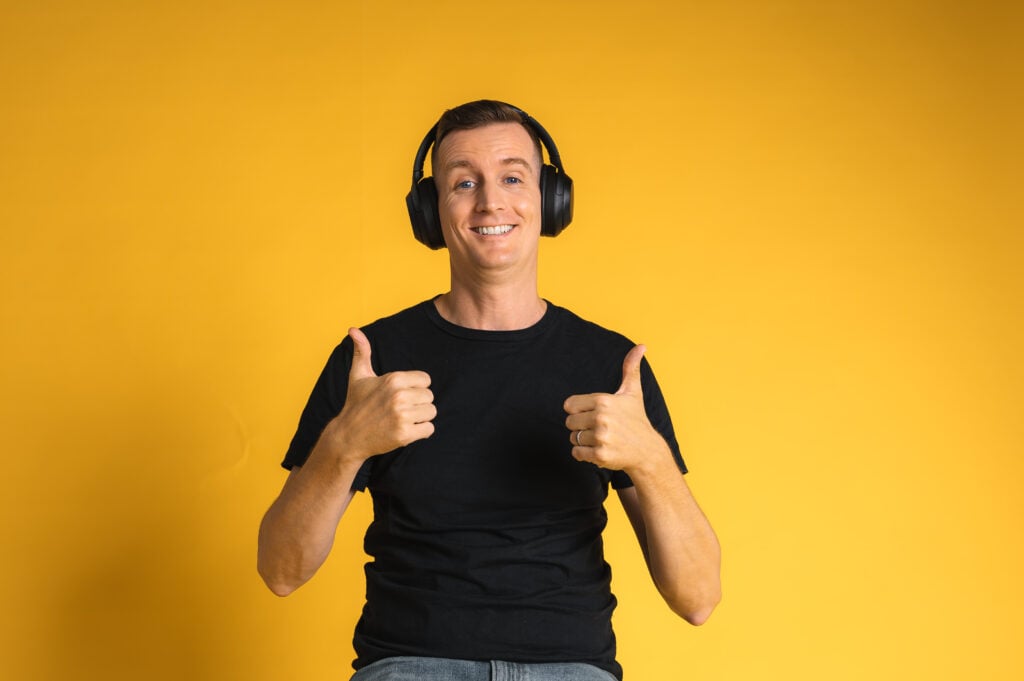What Is The Best Podcast Audio File Format?
Countless audio files, dozens of episodes to edit, but what podcast file format could keep your audio quality without sacrificing your storage? Read more and find out the best audio file formats for podcasting.

By Niall Mackay
Podcasting consists of millions of micro-steps, and finding the best audio file format is nerve-racking. When you get your format right, your listening will also grow.
But what is the best audio format, and how can you determine which suits your show best?
What is an audio file format?
Every podcaster should be familiar with audio file formats. The audio file format is how the recorded audio is stored on your computer, phone, and other digital devices.
Think of it this way: An audio file is the SOUL of your podcast. Therefore the audio file format is the BODY of the audio.
There are several ways to save audio files and what makes them widely different is whether the files are compressed or uncompressed.
Uncompressed audio files
Uncompressed audio files are the raw materials for your podcast episodes. Any compressing algorithm does not change these non-compressed files. Therefore you get a file that is identical to the original audio file. There isn’t any damage to that piece of recording.
However, the only setback is that uncompressed audio files take a lot of storage memory.
So, if you are saving uncompressed audio files, make sure you’re keeping them to external memory devices or upgrading your computer’s storage.
Common audio formats for uncompressed files: WAV. and AIFF.
Compressed audio files
Unlike uncompressed audio files, compressed audio files don’t take much storage. However, the audio quality is affected when you transfer the audio recordings.
When you compress an audio file, all the inaudible content is removed (also known as psychoacoustic analysis), things that we cannot hear with our ears.
Compressed audio files then are cleaned audio files that are compressed or packed smaller for less storage and reduced audio quality.
Are compressed audio formats better for podcasters?
Now you’re thinking if you should compress your audio files or not. The quick answer is that you’ll work with compressed audio files because it removes sounds and unnecessary elements, and your decision should depend on the type of compression.
Are you confused yet? – Let me explain the difference between lossy and lossless compression.
Lossy Compression
Lossy compression means that the audio file shrinks in size and quality during the transfer. After saving it, the end receiver can’t recover it to the original version of the audio recording.
Lossy compression is easy, and it is the most popular audio format. If you go on to any public source and download a file, it usually uses lossy compression.
Common lossy audio formats are AAC, MP3, OGG, and WMA.
Lossless Compression
Lossless compression is the best combination of uncompressed audio files and lossy compression.
In this case, the size of your audio files is still compressed, but you can revert the audio to its original form when you save it to your device.
Golden combo!
Popular lossless audio formats are FLAC. and ALAC.
List of Audio File Formats That You Can Use For Podcasting
Now that we went over the basics of audio file formats, let’s dive in the list of popular audio formats:
WAV
WAV. is the popular audio file format that is often used on Spotify and Apple Podcasts. WAV. does not compromise the audio quality.
AIFF
As the second most popular audio file format, AIFF is a popular choice for mixing, recording, and mastering recordings. AIFF gives you the best audio sound quality because your content does not get compressed or deleted.
FLAC
Do you prefer lossless audio files? FLAC audio format would be your best choice because it reduces the audio file by 70%, yet you can still recover it to 32 bits and 192 kHz.
AAC
Unlike FLAC, the AAC audio file format does not let your recover the compressed file. So I recommend AAC for exchanging small audio files to save the quality of your recording.
MP3
MP3 is by far the most well-known audio format that is supported on almost all devices. MP3 still uses lossy compression, so the audio quality is still affected.
ALAC
ALAC is suitable for large-high-quality recordings and still compresses its size for better storage.
WMA
WMA is best used for Windows. However, it can be troublesome with other operating systems such as iOS. So, avoid sharing WMA files with Apple users.
Best Podcast File Format For Podcasting
We went over the basics and all the popular types of audio file formats. You can’t be surprised that the best podcast file format will depend on your recordings. As long as you feel content with your audio recordings, and the formatting matches your audience’s device, you are good.
If you are still feeling overwhelmed by the choices, here are two tips:
Use WAV For Recording
When you jump into recording your audio, the file format you record will be different from the one you export or upload. During recordings, you have to aim for the highest quality possible.
An uncompressed WAV audio file format should be your best bet. Plus, it is best to do that as a mono file when you record a speaker. Because when you export them, these single mono files will be combined into a stereo file.
Use MP3 For Uploading
Once you are done recording your high-quality WAV files, you are ready for mixing and editing. Here is when podcast editors jump in and remove all the unnecessary sounds and clicks during the recording.
When all this work is done, it is best to compress the files onto a smaller audio format, such as an MP3 file, because it is widely accepted on any podcast platform. Keep in mind that there is always a size limit. That is why MP3 files with a bit rate of 128 kbps. Are great for uploading your podcast shows.
Start your podcast with SMB Podcasts
As a podcaster myself, I also struggled to find the best audio file formats and find my niche to grow my podcast shows.
I just launched an entire beginner course on setting up a podcast from A-Z. Feel free to also book a free consultation with me if you have any questions on starting or crafting your podcasting journey!


